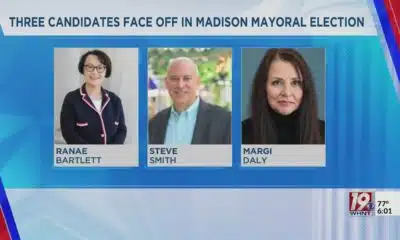News from the South - North Carolina News Feed
Veterans Affairs cuts create concern in NC
Darlene Fore is terrified. She’s a nurse at the Veterans Affairs Medical Center in Asheville: a hard, but stable, federal job. Last year, her family was devastated by Tropical Storm Helene. Now, as she reaches 60 years old, her job, and her retirement benefits, could be taken away at any moment.
So too her union rights to bargain.
Veterans Affairs, the federal agency responsible for providing veterans’ health care, benefits and support services, is cutting staffing by 15% in the name of efficiency.
That means nearly 2,600 people out of a job in North Carolina alone. And more than 72,000 nationwide.
[Subscribe for FREE to Carolina Public Press’ alerts and weekend roundup newsletters]
Fore is not a bedside nurse in Asheville. She reviews charts for medical documentation to judge whether a veteran should be billed for services, asking questions like: Should this person still be in the hospital? Why is this person’s chest pain not going away? Is the doctor following the right care plan?
It’s exactly the kind of behind-the-scenes job President Donald Trump intends to cut.
Some worry that this reduction in force — coupled with an executive order barring federal workers from organizing — will diminish the quality of health care for North Carolina’s 615,000 veterans and their families. North Carolina is the ninth-most populated state, but has the eighth-largest population of veterans.
Others genuinely believe the federal agency is bloated, and that a long, hard look at that bloat will directly benefit veterans: less bureaucracy and waste will mean that veterans are connected with the services they need more quickly.
For Fore, it’s a question of livelihood.
“The thing that bothers me the most is my countrymen saying I’m not worth it,” Fore told Carolina Public Press. “I’m the same nurse who worked in their local hospitals and local health departments. I’m the same nurse who’s always been there for them all this time, and now, all of a sudden, they think I’m a waste of money. I’m furious about that. I’m extremely hurt by my community.”
The Asheville VA is one of the largest employers in Western North Carolina. Since Tropical Storm Helene devastated the area last September, unemployment rates in the area have skyrocketed. The loss of even more jobs is a frightening prospect.
Fore’s daughter and sister both lost their homes in Helene. She is working not only to support herself but to help her family get back on their feet.
On the other side of the equation are the veterans themselves, who come to the VA to receive care. One of these is state Rep. Eric Ager, D-Buncombe, who served in the Navy from 1996 to 2021.
“The VA is more than just a place to show up and get medical service,” Ager told CPP. “It’s a place to support the whole veteran. The VA in Asheville is such a welcoming environment: people have the time to talk to people. That’s not something you see in the regular medical community.
“I’m worried that the cuts will make the workforce at the VA more stressed out and give them less time to actually engage with veterans who need that. Veterans should feel like they’re welcome in a place, as opposed to just getting run through like a number.”
It’s not just Asheville. The VA operates medical centers in Fayetteville, Salisbury and Durham as well.
Ann Marie Patterson-Powell, a nurse at the Durham VA, thinks that cuts anywhere in the system will make bedside nurses’ and doctors’ jobs harder. They will be the ones to pick up the slack, leaving them with less time to actually treat patients.

The right to unionize and bargain is extremely important to Patterson-Powell, who is a union leader for National Nurses United. In her view, VA nurses stand up for veterans, and the union stands up for VA nurses.
Now, President Trump wants to strip federal workers of their union rights.
“You don’t get to do that — to tell me I’m not a part of an organization that keeps me safe at work — even if you are the President of the United States,” Patterson-Powell said.
She is outraged on behalf of the veterans she serves.
“We should all feel shocked and disappointed,” Patterson-Powell said. “The level of disrespect for people who put on a uniform and risked their lives to defend this country is just wrong. Someone has to stand up for them.”
In 2024, the Office of Inspector General determined that the VA was suffering from severe occupational staffing shortages. Before any cuts were proposed, 82% of VA facilities reported nurse shortages. Now, the worry is that wait times and barriers to specialty care will increase even further for veterans.
The current VA leadership doesn’t see it that way.
“As we reform VA, we are guided by the fact that, even though the Biden Administration astronomically grew the department’s budget and number of employees, VA wait times and backlogs increased,” wrote VA press secretary Pete Kasperowicz.
“We are doing things differently. Our goal is to increase productivity, eliminate waste and bureaucracy, increase efficiency and improve health care and benefits to Veterans. We will accomplish this without making cuts to health care or benefits to Veterans or VA beneficiaries.”
Some veterans in North Carolina tentatively agree with this view. One of these is Shawn Kane, chief medical officer at UNC THRIVE, a health program for veterans.
Kane thinks that cuts could be beneficial if they target redundancy, cutting administrative or ancillary positions, while redirecting that saved money directly to patient care. Some old-fashioned inefficiencies exist, like excessive snail-mail appointment reminders, that could be modernized to save money, Kane said.
Detailed, targeted cuts really could improve the system, he thinks. But he isn’t sure that’s what’s in store.
“The devil is in the details,” Kane said.
“The bottom line is that if inappropriate cuts are made, there can be a drastic impact on the provision of health care access across the VA, in North Carolina and across the country. It comes down to nuance, and trying to stay apolitical. But currently, the leaders in our government are not very good at details.”
This article first appeared on Carolina Public Press and is republished here under a Creative Commons Attribution-NoDerivatives 4.0 International License.
The post Veterans Affairs cuts create concern in NC appeared first on carolinapublicpress.org
Note: The following A.I. based commentary is not part of the original article, reproduced above, but is offered in the hopes that it will promote greater media literacy and critical thinking, by making any potential bias more visible to the reader –Staff Editor.
Political Bias Rating: Center-Left
This article primarily emphasizes the potential negative impacts of federal workforce reductions and union rights restrictions on veterans and healthcare workers, portraying the cuts as threats to public service quality and worker security. It presents sympathetic perspectives from affected nurses and veterans, highlighting personal stories and concerns about job losses and care quality. While it includes the administration’s defense of efficiency and reform, the overall tone and framing lean toward advocating for protecting labor rights and public sector jobs, consistent with center-left viewpoints that prioritize social welfare and labor protections.
News from the South - North Carolina News Feed
Flesh-eating screwworm parasite confirmed in US
SUMMARY: The flesh-eating New World screwworm parasite, which feeds on living flesh of warm-blooded animals, has been confirmed in the US for the first time in a human case in Maryland, involving a traveler from El Salvador. This parasite causes severe infections as larvae burrow into wounds, posing a major threat to livestock and wildlife. While no cases have been reported in Texas, concerns persist due to infections in Mexico, including human deaths. Texas officials are working to control the parasite using fly bait and sterile flies from Panama to prevent reproduction and stop its spread, aiming to protect both animals and humans.
The first human case of the flesh-eating screwworm parasite has been confirmed in the U.S. Federal health officials say the risk to the public is low but concerns are growing in Texas, where the agriculture community is already on alert.
WRAL App: https://www.wral.com/download-wral-apps/5787234/
The Latest Weather: https://www.wral.com/weather/page/1010362/
News Tips:
Online – https://www.wral.com/report-it/
Email – assignmentdesk@wral.com
Subscribe to WRAL:
https://youtube.com/c/wral5
Follow WRAL:
Facebook: https://facebook.com/WRALTV
X: https://twitter.com/WRAL
IG: https://instagram.com/wral
About WRAL-TV:
WRAL is your Raleigh, North Carolina news source. Check out our videos for the latest news in Raleigh, local sports, Raleigh weather, and more at https://WRAL.com
#localnews #northcarolina
News from the South - North Carolina News Feed
Omnibus elections bill still simmering in NC legislature
You Can Vote executive director Kate Fellman breathed a sigh of relief when a bill effectively banning voter registration drives died earlier this legislative session after bipartisan pushback. But now, one of a multitude of provisions in the latest version of this year’s elections omnibus bill would do the same thing, albeit in a different way.
The omnibus bill would require registrants to provide their full Social Security number on their voter applications. Under current law, applicants have an option between giving the last four digits of their Social Security number or their North Carolina driver’s license number.
This session’s elections bill began as a “correction to the rush job” the legislature passed last year after the elections, Senate Bill 382, said Mark Swallow, an advocate for left-leaning Democracy Out Loud. Last year’s bill tightened ballot counting and curing deadlines, amongst other election changes, while this year’s bill loosens them a bit.
[Subscribe for FREE to Carolina Public Press’ alerts and weekend roundup newsletters]
However, as the session progressed, it quickly became a grab bag for the Republican majority’s election priorities.
While much of the legislature’s policy work is paused until next year, the elections omnibus is on a different timeline. It may see movement as early as September, according to bill sponsor Rep. Hugh Blackwell, R-Burke.
In Swallow’s view, it’s come a long way, but still has a ways to go.
And in an increasingly uncommon move in North Carolina’s GOP-led legislature, Blackwell is taking in everyone’s feedback on the omnibus before moving forward.
Social Security number, please
Fellman does a lot of voter registration as part of You Can Vote, a civic organization focused on voter education and empowerment.
She already hears concerns about the security of providing the last four digits of registrants’ Social Security numbers. Some of the younger registrants don’t know their number offhand, and have to call or text their parents to get the information, which raises further security issues, she added.
“Nobody would give (their full SSN) to a stranger just out on the street,” Fellman said. “… I just don’t know how you could actually do paper voter registration form collection.”
Jim Womack, president of the conservative North Carolina Election Integrity Team, said having a full Social Security number, as the omnibus would require, would make list maintenance easier, as the only true unique data point among voter registrants.
NCEIT is a chapter of the Election Integrity Network, founded by former Trump lawyer Cleta Mitchell. Mitchell helped Trump in his failed bid to overturn the 2020 election. Now Rep. Pricey Harrison, D-Guilford, and several others think North Carolina lawmakers are following her election policy playbook.
Womack, for his part, said providing a full Social Security number is no more dangerous than providing any other information at a voter registration drive.
“If it’s the full Social, they’ve got to protect it the same way they do the last four (of the SSN) or the driver’s license number, because both of those are protected as well,” he said. “So I mean, there’s always risk in allowing voter registration drives.”
‘How it should be’
At a late June House Election Law committee meeting, Harrison posed a concern to Blackwell about a provision of the omnibus bill that would have barred boards of election from “encouraging or promoting voter turnout in any election.”
The provision seemed “a bit vague” to her. Didn’t they want the county boards to encourage turnout? Wasn’t part of their job to promote voting?
Blackwell assured Harrison that there was more work to do on the bill before it was ready for a vote.
“The idea is that we want the State Board to focus on the conduct of the election, and that the responsibility for turnout is better handled by other folks,” he said. “We were trying to draw a line, and we may not have gotten it just at the sweet spot.”
The next time the omnibus bill was heard in committee, the turnout provision was axed. And instead of moving straight from the elections committee to rules, where the bill would have likely been expedited to a floor vote, the bill was assigned an additional committee hearing.
After that committee meeting, where Harrison raised other concerns, Blackwell’s staff emailed her to ask further questions. While Harrison still has a list of issues with the omnibus bill, she gave credit to Blackwell for being amenable to changes, and giving the bill time to improve.
“I’d rather them do it out in the open, in a committee, than to go into a back room and figure out what’s going to work,” she said. “This is actually a better, more public process. This is how it should be.”
The omnibus bill has undergone a number of other changes since its debut.
Instead of offering State Board of Elections Executive Director Sam Hayes the ability to make 25 political hires — which he said were needed to ensure “ the folks that are surrounding me, certainly my direct reports and I, are aligned on the vision for the agency” — the latest version gives him five positions.
An initial campaign finance provision limiting foreign nationals’ ability to contribute to referendum committees has turned into a broader ban on foreign national contributions for any candidate, political committee, party or treasurer.
The latest version officially takes back the ability of so-called “Never Residents” to vote in state elections, in line with recent court rulings, and limits the acceptable photo ID documents for overseas and military voters.
And of course, it changes some deadlines.
‘Humanly not possible’
Last Election Day, the Wake County Board of Elections received 4,800 absentee ballots before the 7:30 p.m. cutoff.
Staff checked ballots, conducted data entry and reviewed the voter and two required witness signatures on each envelope before adding them to the tally.
If last year’s Senate Bill 382 had been in effect, Wake County’s count would have begun at 5 p.m. on Election Day and run continuously until there were no ballots left, with no leaving the room allowed, except in case of an emergency.
That would have meant spending one or two nights in the office, Wake County Board of Elections Democrat Gerry Cohen said. It wasn’t a realistic ask.
Last year’s bill also moved up deadlines for counting and curing provisional and absentee ballots. Before its passage, county elections staff had until the day before county canvass, nine calendar days after the election, to count and cure all the ballots. Senate Bill 382 gave staff just three business days after the election to do so.
This year’s omnibus bill takes it back — kind of. It would give election officials five business days after the election to complete the job.
Lee County Board of Elections Republican Jay DeLancy, who founded the right-leaning Voter Integrity Project, said the deadlines set under SB382 were “humanly not possible” without a hiring surge.
As an election integrity advocate, DeLancy liked the idea of the count being “continuous,” but as a board member, his perspective has shifted slightly.
“The things election integrity people like me have been complaining about were not all put there for nefarious purposes,” he said. “Now we’re having to see, oh, it was done for a pragmatic purpose, just so we have time to count them.”
However, DeLancy wants stronger penalties for those who share ballot count results before the polls close to avoid any possibility of fraud.
What else is in the omnibus bill?
North Carolina absentee voters must attach a copy of their photo ID to their ballot, and either get two witnesses or a notary to sign the envelope.
Last year, the State Board of Elections was supposed to try a third security measure — signature verification — but the pilot program never quite got off the ground due to issues finding an acceptable vendor.
Signature verification requires the use of a machine to detect whether a voter’s signature belongs to them. If North Carolina implemented it through the omnibus bill, it would be the only state to require three security measures for absentee voters.
Hayes’ chief of staff Brian LiVecchi told lawmakers they’ve discussed potential vendors to avoid and seek out with other states. The pilot program wasn’t made a priority under the previous State Board of Election administration, he said. They would like to change that.
Harrison isn’t a fan of the idea.
“They’ve been wanting to go down this road for a while, but we know that there’s a long history of folks getting thrown out because of their signature,” she said. “And anybody who’s watched their signature change from age 18 to 40 or to even 80. I mean, nothing looks the same.”
Hayes, who worked in the legislature as House Speaker general counsel until a few months ago, has fingerprints all over the elections omnibus bill.
Besides the signature verification piece, Hayes was clear that securing positions exempt from the North Carolina Human Resources Act, which bans political hiring and firing, was a top concern. Under the current bill, the State Board would also be able to hire private counsel for legal matters, removing the Democratic attorney general from the picture and shielding any documents from the public records law.
Swallow trains elections workers, and he said these provisions violate one of his golden rules.
“One of the things we tell our poll workers is that the only people that can be partisan in our elections are the candidates, and that’s changing with this bill,” he said.
Even bipartisan sections of the elections omnibus bill face obstacles. The provisions attempting to block foreign influence in elections and campaign finance aren’t quite across the finish line yet, according to Womack.
“They’re struggling to find language that would allow them to restrict referendums or foreign funding of referendums and that sort of thing without infringing on First Amendment rights,” Womack said.
No language change is going to be effective unless the legislature repeals two recent laws that make it easier to cover up the origins of funds, Harrison said.
And some of the omnibus bill’s provisions don’t do anything at all, except maybe send a message, Cohen said.
The omnibus bill bans ranked choice voting, a process by which voters rank candidates instead of choosing just one, and no winner is crowned until they earn a majority. The election method is lauded by supporters for producing more moderate consensus winners and criticized by opponents for being too confusing for voters.
But ranked choice voting already doesn’t happen in the state, and it would take express permission by the legislature for any localities to allow it. Laws that allowed ranked choice voting experiments in Cary and Hendersonville years ago have expired, Cohen said.
A ways to go on omnibus
Fellman is concerned about the timeline. If the elections omnibus becomes law, most of it goes into effect Jan. 1, 2026. That’s just a few months before the 2026 primary election, which isn’t much runway to implement changes and educate voters, she said.
There will likely be legal challenges, which may make things murkier, she added.
At the end of the day, House Democrats have a leg — or seat — up. If they decide they’re not satisfied with the bill, they can block a veto override. Generally, Democrats tend to stick together on election matters, Harrison said.
Swallow isn’t so confident after swing Democrats have sided with Republicans on several veto overrides so far this session.
“There are things in this bill that fix issues, like the curing of ballots timeframe,” he said. “But I hope that doesn’t convince Democrats that this is something they should be voting for.”
This article first appeared on Carolina Public Press and is republished here under a Creative Commons Attribution-NoDerivatives 4.0 International License.
The post Omnibus elections bill still simmering in NC legislature appeared first on carolinapublicpress.org
Note: The following A.I. based commentary is not part of the original article, reproduced above, but is offered in the hopes that it will promote greater media literacy and critical thinking, by making any potential bias more visible to the reader –Staff Editor.
Political Bias Rating: Center-Left
The content presents a detailed examination of election-related legislation with a focus on concerns raised by voting rights advocates and Democrats, while also including perspectives from Republicans and conservative figures. It highlights potential negative impacts of the Republican-led bill on voter registration and election administration, emphasizing issues like voter access and election integrity from a critical standpoint. The inclusion of critiques about Republican priorities and the framing of certain provisions as restrictive or problematic suggests a center-left leaning, aiming to inform readers about the implications of the legislation with a slight emphasis on protecting voter rights and transparency.
News from the South - North Carolina News Feed
How much lottery money do Buncombe County, Asheville City Schools get? Why doesn’t the Buncombe Sheriff’s Office have an app? • Asheville Watchdog
Today’s round of questions, my smart-aleck replies and the real answers:

Question: Earlier this year, Asheville City Schools faced a $4 million budget deficit, Buncombe County schools a $7 million deficit. Each year schools are begging communities and families for basic classroom supplies. So what are the North Carolina “Education” Lottery proceeds doing for Asheville and Buncombe County? Is that money evaporating in Raleigh like so much other funding?
My answer: I’m waiting for the schools to catch on to this whole scheme and start running their own lotteries to pay for school supplies and nice extras. What better way to educate the students on managing odds than having them buy lottery tickets every week with very little chance of winning anything?
Real answer: Both ACS and Buncombe County schools derive sizable funding from the lottery, which North Carolina created in 2005 with the stated goal of funding school construction, scholarships and other educational programs.
Lottery spokesperson Van Denton noted that the North Carolina General Assembly “decides in the state budget the best allocation of lottery funds to education programs in North Carolina.” He provided a report from the legislature’s Fiscal Research Division that shows a county-by-county allocation of lottery proceeds for fiscal year 2024, which totaled $1 billion. (The 2025 fiscal year report is due this fall).
It’s important to note that disbursements go to the county schools systems, which then disburse monies to their system and other systems in the county, in our case Asheville City Schools. So that report lists all 100 North Carolina counties.
The report shows Buncombe County/Asheville City Schools education programs received $10.9 million in fiscal year 2024 in the following areas:
- School construction: $2,336,826.
- School support staff: $6,502,758.
- NC Pre-K: $1,076,191.
- College scholarships: $710,902.
- School Transportation: $338,670.

“School construction funds would go to Buncombe County and would be used to meet capital needs for Buncombe County Schools and Asheville City Schools,” Denton said. “Buncombe County received, according to the legislative report, $1,836,826 from the Public School Building Capital Fund and $500,000 from the Public School Repair and Renovation Fund for a total of $2,336,826. The county and school system work together to draw down those dollars to help build new schools and repair or renovate older ones.
The funds are administered by the Department of Public Instruction.”
I reached out to DPI via email and phone, multiple times, but never heard back.
Denton said the prekindergarten funding “provided a free academic preschool to 171 four-year-olds in Buncombe County in FY24, according to the legislative report,” Denton said, noting that about half of the North Carolina Pre-K classes in the state are operated in public schools.
“Finally, $710,902 went to help Buncombe County students attend a state community college or state university,” Denton said, adding that the scholarship program is based on financial need and administered by the N.C. State Education Assistance Authority. “The lottery supports the Next NC Scholarship, which is awarded based on financial need.”
Buncombe County acts as a pass-through for lottery funding. Lillian Govus provided me with a chart of the lottery-funded construction projects that are open in the current fiscal year.
The Asheville City Schools’ disbursement totals $1.24 million and lists these projects:
- Asheville High School construction — baseball field lights: $330,000.
- Asheville High School construction — classroom renovation: $315,000.
- Asheville High — design of baseball field lights: $30,000.
- Asheville High — design, classroom renovation: $40,000.
- Asheville Primary School — emergency capital improvements design: $210,000.
- Asheville Primary School — office mold remediation/renovation project: $315,599.
Buncombe County shows $5.9 million in construction projects, covering 21 different projects.
If you’re like me, you probably noticed that the state numbers and county numbers don’t quite match up.
Buncombe County spokesperson Lillian Govus explained this discrepancy.
“We only see the capital-related dollars,” Govus said. “We would not see the program or operating dollars provided directly to the schools or know how much they received until their annual financial reports were released and reviewed.”
Additionally, the list of projects the county provided are currently active projects, independent of year of adoption.
“Most capital projects take more than one year to complete, so this list represents multiple years of lottery funding,” Govus said. “We closed $1.89 million of lottery projects in May.”
One criticism of the lottery funding is that legislators have become reliant on it to fund basic education needs, instead of using traditional funding.
Heidi Faber Kerns, chief financial officer for Asheville City Schools, sees it that way, too.
“Unfortunately, the NC Lottery fund is another good example of increased revenue which has been used by the legislature to supplant what had been traditional state general fund budget line items in the past,” Kerns said. “We are thankful that the funds are there, but except for a small amount of capital funding (grants have been very helpful to districts with construction), the funds from the lottery have become part of the annual allotment process in our budgets, not supplemental to that which we had been receiving in the past.”
Govus also expounded on the lottery funding being a relatively small part of the overall budget. The county’s budget director, Govus, pointed out that though the lottery sent $10.9 million to Buncombe County, the county’s contribution to local school systems for operating expenses alone in fiscal year 2024 was $113.3 million.
Further, Govus pointed out that, “Local law also directs local Article 39 sales tax (that is unrestricted for every County except Buncombe) to local school capital projects. That revenue in FY2024 totaled $28.8 million.
“Currently, there are 93 open capital projects for the two school systems with a total budget of $135 million using that revenue,” Govus said.

Question: My question today is two-fold: It seems that most counties around us have an app for their sheriff department. Why doesn’t Buncombe County? And two, has Sheriff Quentin Miller discontinued traffic stops? We’re in dire need of them, especially here in Big Sandy Mush and on Leicester Highway, which, rumor has it, is one of the ten most dangerous roads in North Carolina. My niece, a former police officer now living near Los Angeles, visited for a week and was astonished at the driving she witnessed.
My answer: Man, what’s next? Folks from Atlanta telling us there’s just too much traffic around these parts to consider living here?
Real answer: Buncombe County Sheriff’s Office spokesperson Matthew Marshall handled these queries, starting with the one about the app.

“We did have an app in the past, but the ongoing costs of development, updates, and maintenance, amounting to thousands of dollars annually, didn’t make sense given how infrequently it was being used,” Marshall said via email. “That money has instead been reallocated into building and maintaining a more community-friendly, engaging, and informative website for the Sheriff’s Office. Which serves a far larger portion of our citizens on a daily basis.”
Marshall said most interaction with citizens “centers around community alerts, website updates, social media communications, and local media outreach.
“Unlike some larger jurisdictions or municipal police departments, we don’t manage daily traffic accident updates, road closures, or municipal services, functions that often justify an app’s existence and regular use,” Marshall said. “It’s also worth noting that research consistently shows people use only a small handful of apps regularly, despite having dozens installed.”
Marshall cited data from the app-building company Buildfire that states on average users interact with about 10 apps per day and 30 per month, out of more than 80 apps installed on their devices. Many apps go unused, and retention drops steeply, with most apps losing over 70 percent of their daily users in just the first week, according to Andrew Chen, an investor in online venture and the author of a book on growing startups.
“Given these factors, we believe continuing to invest in our website, maintaining a strong social media presence, and partnering with local media is the best way to keep our community informed and engaged,” Marshall said.
Regarding traffic stops, Marshall said Sheriff Miller has not discontinued them.
Asheville Watchdog welcomes thoughtful reader comments on this story, which has been republished on our Facebook page. Please submit your comments there.
Asheville Watchdog is a nonprofit news team producing stories that matter to Asheville and Buncombe County. Got a question? Send it to John Boyle at jboyle@avlwatchdog.org or 828-337-0941. His Answer Man columns appear each Tuesday and Friday. The Watchdog’s reporting is made possible by donations from the community. To show your support for this vital public service go to avlwatchdog.org/support-our-publication/
Related
The post How much lottery money do Buncombe County, Asheville City Schools get? Why doesn’t the Buncombe Sheriff’s Office have an app? • Asheville Watchdog appeared first on avlwatchdog.org
Note: The following A.I. based commentary is not part of the original article, reproduced above, but is offered in the hopes that it will promote greater media literacy and critical thinking, by making any potential bias more visible to the reader –Staff Editor.
Political Bias Rating: Centrist
The content provides a fact-based inquiry into local educational funding and law enforcement practices, presenting different perspectives and official statements without evident editorializing or ideological framing. It highlights both the benefits and criticisms of the education lottery and transparently conveys government responses, reflecting a balanced approach. The tone is pragmatic and focused on accountability rather than promoting a partisan viewpoint, indicative of a centrist or neutral stance.
-
Our Mississippi Home7 days ago
MSU Unveils Mixed-Use Development Featuring Boutique Hotel, Cultural Landmark
-
News from the South - Alabama News Feed7 days ago
Grants to boost local emergency alert systems in question as public media agency closes
-
News from the South - Arkansas News Feed6 days ago
New I-55 bridge between Arkansas, Tennessee named after region’s three ‘Kings’
-
News from the South - Arkansas News Feed7 days ago
‘Alligator Alcatraz’ probed by Dems as ICE detention centers multiply in states
-
News from the South - Texas News Feed3 days ago
DEA agents uncover 'torture chamber,' buried drugs and bones at Kentucky home
-
Local News7 days ago
Winged ferry that glides like a pelican tested for coastal transportation
-
News from the South - North Carolina News Feed7 days ago
How civics class could stage a comeback in NC schools
-
News from the South - Louisiana News Feed6 days ago
Families with citizen children deported by ICE sue Trump administration











































